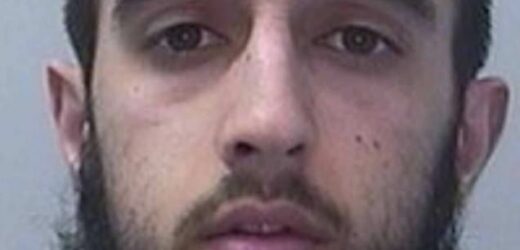EXCLUSIVE: Extremist, 30, who called himself ‘The father of terrorism’ is walking the streets free – despite being previously turned down for parole for being ‘too risky’
- Khuram Iqbal was rejected for release in October, but was freed in December
A British terrorist who was turned down for parole was automatically released just two months later at the end of his sentence and is now walking the streets of the UK.
Khuram Iqbal, now 30, who once called himself the ‘father of terrorism’, was rejected for release by the Parole Board in October 2022, but was allowed to leave prison in December that year.
Under current law, convicted terrorists like Iqbal who are on a fixed determinate sentence and have behaved in prison will be released with a limited number of restrictions.
For Iqbal, originally from Cardiff, these restrictions are unlikely to be more than a police notification order, which requires those given more than 12 months for terror offences to advise the police of practices such as unauthorised travel.
Originally imposed on Iqbal in 2014, if it has not been increased, the order will run out next year. The Home Office says it does not comment on individual cases, so it is not known if Iqbal has any new restrictions placed on him.
Khuram Iqbal, now 30, was turned down for parole but then was automatically released just two months later at the end of his sentence
Other typical areas covered by the order include providing personal information such as home address, date of birth, National Insurance number, vehicle details, and bank account details.
The limited amount of surveillance will be of concern as Iqbal has shown a willingness in the past to try and travel to join a proscribed group and also an appetite to disseminate violent and extremist Jihadi propaganda.
Iqbal, then 21, was jailed in 2014 for three years and three months for disseminating terrorist publications and possessing terrorist information.
He was released on licence in May 2015 but recalled to jail in 2016 for breaching a ten-year notification order by failing to tell police about two cryptocurrency accounts.
In December 2021, he pleaded guilty to four breaches between July 2019 and August 2021 and was sentenced to a further 16 months in prison.
In October 2022, the Parole Board rejected Iqbal’s parole application.
A spokesman for the Parole Board told MailOnline: ‘We can confirm that a panel of the Parole Board refused the release of Khuram Iqbal following an oral hearing.
‘Parole Board decisions are solely focused on what risk a prisoner could represent to the public if released and whether that risk is manageable in the community.
He was released on licence in May 2015 but recalled to jail in 2016 for breaching a ten-year notification order by failing to tell police about two cryptocurrency accounts
In December 2021, he pleaded guilty to four breaches between July 2019 and August 2021 and was sentenced to a further 16 months in prison
‘A panel will carefully examine a huge range of evidence, including details of the original crime, and any evidence of behaviour change, as well as explore the harm done and impact the crime has had on the victims.
‘Members read and digest hundreds of pages of evidence and reports in the lead-up to an oral hearing.
‘Evidence from witnesses such as probation officers, psychiatrists and psychologists, officials supervising the offender in prison as well as victim personal statements may be given at the hearing.
‘It is standard for the prisoner and witnesses to be questioned at length during the hearing which often lasts a full day or more. Parole reviews are undertaken thoroughly and with extreme care. Protecting the public is our number one priority.’
The Ministry of Justice confirmed that Iqbal is no longer in jail and remains free in the UK.
The trial of Iqbal in 2014 shone a light on the use of extremist material online to incite others to support terrorist organisations.
Woolwich Crown Court was told that Iqbal advertised videos and articles which glorified terrorism for sale on six different Facebook pages.
His online name was Abu Irhaab – Arabic for father of terrorism.
Iqbal, a student at the time, admitted charges including the dissemination of terrorist publications.
The court heard he was caught with nine copies of al-Qaeda magazine ‘Inspire’ on his laptop when he was arrested on October 8, 2013.
Copies of the extremist publication included material designed to attract Muslims to violent anti-Western activities.
Woolwich Crown Court was told that Iqbal advertised videos and articles which glorified terrorism for sale on six different Facebook pages
One issue featured an article entitled ‘How to make a bomb in the kitchen of your mum’, along with instructions on handling an assault rifle and how to make and detonate a fire bomb.
He had also attempted to join the Jihadist cause when he fled to Kenya with a friend in October 2011, the court heard.
Both had ‘displayed signs of radicalism prior to travelling’, according to prosecutor Roger Smart who explained their families had reported them missing on October 8 of the same year.
The pair were deported following their arrest in Kenya about 20km (12 miles) from the Somali border but faced no further charges on return to the UK.
On 1 August 2012 it was said Iqbal made a second attempt to ‘join the terrorist cause’ by flying to Turkey with two friends.
Jailing Iqbal, Judge Christopher Kinch QC said some of the material included videos glorifying Jihadi acts of violence, including some by Osama Bin Laden, and praising radical speeches by extremist leaders such as Abu Hamza.
Other videos showed extremist training camps in action in Syria. Judge Kinch said: ‘When you disappeared to Kenya it was out of the blue, and caused a lot of anguish to your family.
‘You are susceptible to influence by others, and you were struggling with anxiety and panic attacks at the time of offending.
‘The overall view is that you are a young man in the grip of extremist influence.’
Nathan Rasiar, defending Iqbal, told the court Iqbal accepted he was subject to ‘some extreme views’.
The hearing was also told that following the failed Kenya trip, Iqbal was enrolled on the Government’s Prevent program – engaging in meetings with Islamic scholars to move away from extremist views.
But during his engagement with the program Iqbal posted a wide range of videos and texts glorifying terrorism.
In total he published links to 848 examples of extreme content on the internet.
In December 2021, at his trial, the Old Bailey heard he had traded in cryptocurrency via an account with online platform Coinbase.
Between November 10, 2017 and March 20, 2021 there were 392 transactions, with nearly £12,000 deposited.
In January 2020, Iqbal made three Bitcoin transactions on a site on the dark web used for selling stolen credit card credentials.
Coinbase issued a suspicious activity report prompting a police investigation.
An examination of a mobile phone found at his home revealed cryptocurrency applications as well as a browser enabling access to the dark web.
Interviewed by police, Iqbal said he dealt in cryptocurrency but denied using the dark web.
Mr Justice Sweeney told Iqbal: ‘The very nature of cryptocurrency is that it is untraceable and in the end with both your emails and cryptocurrency accounts below the surface, you were able to conduct in numerical terms a considerable amount of trading in cryptocurrency under the radar of the requirements in circumstances where that should not have been the case.’
Court reports at the time did not state that Iqbal had received any increase to his ten-year police notification order issued in 2014.
The Home Office told MailOnline: ‘Protecting the British public is our first priority. We have strengthened the tools available to the Security Service and Counter-Terrorism Police to manage the risk posed by individuals of terrorism concern, including those released from prison.’
It said the Counter-Terrorism and Sentencing Act 2021 introduced enhanced sentences and penalties for terrorist offenders.
Source: Read Full Article






